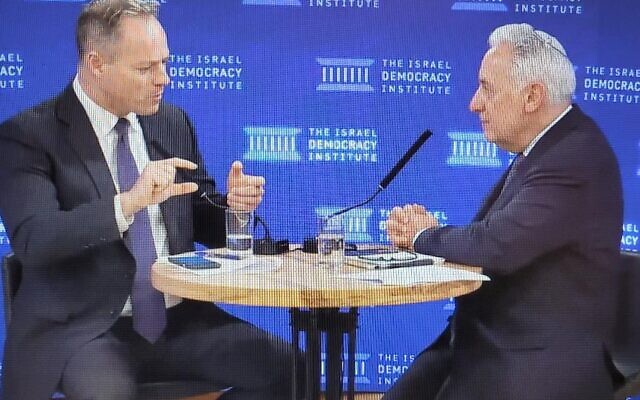Orientation & Webinars on New Israeli Government
Israelis say that American Jews should have a voice in the direction of Israel’s democracy.
Within a week of the swearing in of the new Israeli government led by Prime Minister Benjamin Netanyahu, several American Jewish organizations coordinated webinars for their constituencies to help them understand the ramifications of the new coalition which some have called the most right-wing in Israel’s history and all have noted, the most religious, since the country was formed nearly 75 years ago.
On Jan. 4, the Jewish Federations of North America joined with the Israel Democracy Institute to explain Israel’s new government, with JFNA president and CEO Eric Fingerhut directing questions to IDI president Yohanan Plesner and IDI vice president of research Suzie Navot.
A day later, the Israel Policy Forum sponsored “Bibi Back in Business: The New Netanyahu Government’s Priorities,” during which IPF CEO David Halperin questioned IPF Israel Fellow Nimrod Novik and IPF chief policy officer Michael Koplow.
On Jan. 9, the New Israel Fund, in coordination with Americans for Peace Now, were scheduled to hold a webinar entitled, “Confronting the Israeli Government’s Attack on Democracy.”
Bottom line, according to these organizations, American Jews should expect major changes in Israel’s system of governing. As Novik explained, currently, Israel has only two branches of government because its legislative branch is composed primarily of the executive branch. The judiciary is the only “restraining branch” of government.
“The coalition agreements, which are likely to drive policy,” he said, “threaten to violate every value enshrined in our Declaration of Independence. This goes beyond the judicial system,” referring to proposals to weaken the judicial branch of government.
But IDI president Plesner doesn’t call the new government particularly right-wing. Nor does he consider the Israeli electorate to be strongly right-wing. He noted that out of 120 Knesset seats, the coalition has 64 seats, compared to the opposition having 56. And, he said, 2.3 million Israelis voted for both political blocs. The nearly even split has continued through the last number of elections over the past few years.
Plesner does, however, call this the most religious government in Israel’s history, with 32 of the 64 coalition members either Orthodox or ultra-Orthodox. Of the 32, 18 are ultra-Orthodox, he said, and 14 are far-right religious Zionists. “This is not classical national religious, but a much more extreme version of Orthodox,” he said. The other half of the coalition government is a “weakened” and different Likud Party from its historical version.
Ultra-Orthodox parties have been a part of Israel’s government almost continuously since 1973, Plesner pointed out, but this time Netanyahu has no other options for a government other than to include those parties. He “needs them more now,” giving them disproportionate power. This government will demonstrate a different national projectory.” The ultra-Orthodox will receive larger budgets, less supervision of their school system – meaning that core subjects of English and math might not be taught – and more control over the entire public sphere. That includes possible segregation of men from women at public areas.
An IDI survey of Israelis showed only 20 percent support the separation of men and women in public spheres. The same survey revealed that other proposed government changes, such as no longer recognizing Reform and Conservative conversions and changing the Law of Return to limit who can immigrate to Israel, are also not popular among Israelis. Only 30 percent support the former and 29 percent support the latter.
An IDI survey of Israelis showed only 20 percent support the separation of men and women in public spheres. The same survey revealed that other proposed government changes, such as no longer recognizing Reform and Conservative conversions and changing the Law of Return to limit who can immigrate to Israel, are also not popular among Israelis. Only 30 percent support the former and 29 percent support the latter.
Navot suggested that there’s less chance for those legislative changes to be made, or restrictions on the LGBTQ+ community. “It’s easier for the government to deal with issues that Israelis don’t understand,” such as how judges are chosen or whether the legislative branch can overturn Supreme Court rulings.
The majority of Israelis are still secular or traditional – not Orthodox, said Plesner. Currently 13 percent define themselves as ultra-Orthodox, but that is growing. A decade ago, it was only 10 percent and, by 2030, it’s expected to be 16 percent, which he called “dramatic growth.”
Israelis, facing the major changes written in the coalition agreements, have not yet coalesced. “The opposition in the Knesset has yet to get its act together,” said Novik. “But I have very little doubt we will see massive demonstrations once this sinks in.” Indeed, days after he spoke, about 10,000 Israelis demonstrated in Tel Aviv against the new government.
JFNA’s Fingerhut asked Plesner whether the American Jewish community can impact the direction of the new government. “Israel is defined as the state of the Jewish people, so the Jewish people have skin in the game,” Plesner said. “It’s important for the Jewish community to have a voice,” referring to the fact that Israel is such a major part of the identity of American Jews.
Plesner then noted the shared values and shared interests of Jews in Israel and abroad. “If there’s a change in Israel’s democracy, those shared values are eroded. So, it is not for Israelis to decide alone.”
- Israel news
- politics
- Jan Jaben-Eilon
- Benjamin Netanyahu
- American Jewish organizations
- Jewish Federations of North America
- Israel Democracy Institute
- Eric Fingerhut
- Yohanan Plesner
- Suzie Navot
- Israel Policy Forum
- Bibi Back in Business: The New Netanyahu Government’s Priorities
- David Halperin
- Nimrod Novik
- Michael Koplow
- New Israel Fund
- Americans for Peace Now
- Likud Party
- Knesset
- Law of Return
- LGBTQ




comments